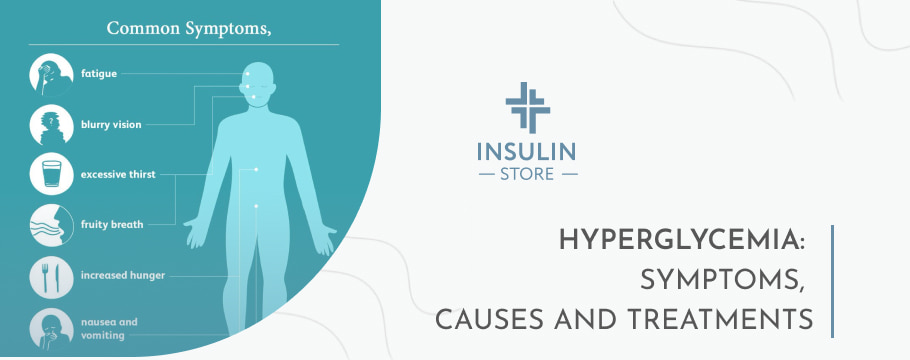
Hyperglycemia: Symptoms, Causes, and Treatments
We bet you have already heard about diabetes, as it is one of the most widely spread metabolic disorders in the world. It’s hard to believe, but more than 10 percent of the overall U.S. population suffer from a certain form of diabetes and are, therefore, dependent on insulin.
But have you heard anything about hyperglycemia, which is the primary symptom of diabetes? In case you haven’t, it’s easy to fix. Simply go through this article to check out what are the symptoms, causes, and treatments of hyperglycemia.
What Is Hyperglycemia?
Hyperglycemia is a health condition that is characterized by high blood sugar levels (or, as they are also referred to, blood glucose levels). In most cases, it occurs because:
- Your body does not produce insulin sufficiently;
- Your body does not make use of insulin properly.
Both above-mentioned cases might lead to serious health issues. Here is how it works: if your body produces little to no insulin or does not make proper use of it, the sugar (or glucose, if you wish) that you gain from food cannot enter your cells and be transformed into energy. As a result, your body starts to use fat for energy, which leads to the production of ketones (toxic acids) that have an extremely negative impact on your health.
As a side note: Insulin is a hormone that is produced in the pancreas. It regulates the way your body transforms sugar it gets from food into energy. In other words, it is insulin that transports glucose from your blood to your cells. So, enough insulin that functions correctly plays a crucial role in the proper condition of your health.
As well, hyperglycemia is the main indication of diabetes mellitus, which is a chronic disease that requires regular management. Unless treated properly, high blood glucose might either lead to serious complications of a patient’s health or be life-threatening.
As a side note: There exist several types of diabetes mellitus, while type 1 and type 2 are the most widely spread ones.
What Are the Symptoms of Hyperglycemia?
Hyperglycemia is characterized by a number of health conditions that might be detected with the help of:
- Self-monitoring;
- A medical investigation.
Here is the list of principal high blood sugar symptoms:
- Frequent urination;
- Increased thirst;
- Accelerated hunger;
- Blurred vision;
- Weight fluctuation (either loss or gain);
- Poor process of wound healing;
- Dry skin;
- The feeling of dryness in the mouth;
- Fatigue;
- And other symptoms.
As a side note: The first three health conditions in the above-mentioned list are the most widely spread early signs of hyperglycemia.
However, the most exact symptom of hyperglycemia is a high level of glucose in the blood, which can be identified by a special blood test.
As a side note: A “normal” level of glucose in one’s blood depends on the age, weight, and gender of a person and is rather individual. In general, its normal range should be less than 5.7% in an A1C test.
A reassuring but at the same time dangerous thing about hyperglycemia is that its degree is not stable:
- On the one hand, you might achieve normally low blood sugar levels if you follow certain recommendations;
- On the other hand, however, untreated hyperglycemia might worsen with time and, therefore, lead to severe health complications, such as skin infections, blood vessels injury, poor blood flow, nerve damage, or even diabetic coma.
In general, it is of vital importance to pay attention to the symptoms of high blood sugar levels that are mentioned above and manage them efficiently.
What Causes High Blood Sugar Level?
Now, it’s high time to discuss the primary reasons for hyperglycemia. And, believe us or not, they have little to do with having a sweet tooth.
The condition of high blood glucose levels might be caused by a wide range of factors, such as:
- Genetic predisposition. Hyperglycemia occurs with a higher frequency if you have already had cases of hyperglycemia in your bloodline;
- Overweight. Sometimes, excess weight might lead to excess sugar in the blood;
- Severe illness. An acute disease might serve as a trigger to the so-called transient hyperglycemia, especially in children;
- The intake of certain medications (such as steroids);
- High blood pressure;
- Cholesterol;
- Physical stress;
- Emotional stress;
- Etc.
As a side note: Interestingly enough, the ethnicity of a person also plays a tiny role when it comes to hyperglycemia risk factors. People who belong to African, Native American, Hispanic, or Asian ethnicities have a higher predisposition to high blood sugar levels.
How to Treat Hyperglycemia?
The treatment of hyperglycemia strongly depends on its cause. For instance, if your case of high blood sugar is episodical and has been caused by high blood pressure, you might take special blood-pressure medications and, in this way, take care of your hyperglycemia.
However, if you live with continuous hyperglycemia, the following methods might come in handy:
- Maintaining a healthy weight;
- Keeping a balanced diet;
- Avoiding stress;
- Taking special medications (like diabetes medication);
- Etc.
In the worst case, you might also need to undergo emergency treatment to manage a severe episode of hyperglycemia.
As a safety note: Please remember that ONLY an experienced health care practitioner is eligible to diagnose hyperglycemia and prescribe you the necessary treatment. Therefore, contact your doctor as soon as possible in case you suspect high blood sugar levels within your body. As well, take A1C tests from time to time if you are predisposed to hyperglycemia.
Final Words
All in all, hyperglycemia is a widely spread (especially among people with diabetes) health condition of high blood glucose levels that is characterized by such indications as increased frequency of urination, excessive thirst, accelerated hunger, and many others. While having a chance to be caused by a wide range of reasons starting from genetic predisposition and ending with emotional stress, hyperglycemia might be treated with the help of different methods (that should be prescribed by your health care practitioner).
So, monitor the signs and symptoms of abnormally high levels of sugar in your blood on a regular basis, consult with your doctor if needed, and stay healthy at all times!
